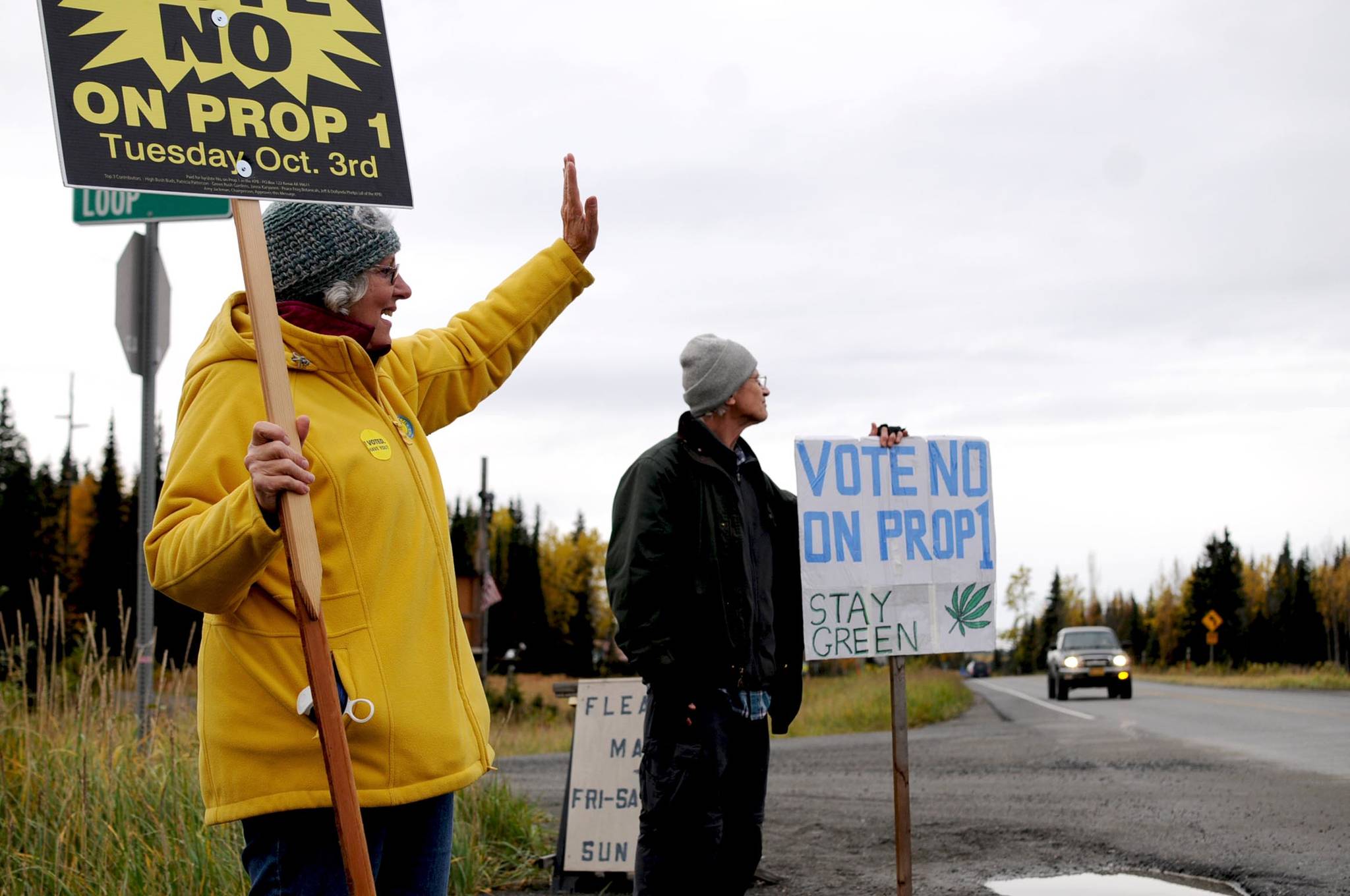Cannabis businesses in the borough outside the cities can continue operations as usual with the failure of Kenai Peninsula Borough Proposition 1, according to Tuesday’s unofficial election results.
Not counting absentee ballots, the proposition, which asked whether commercial cannabis operations should be legal in the borough outside city limits, failed by a landslide on Tuesday — more than 64 percent of the voters in the borough opposed it, with about 36 percent supporting it.
The defeat was a victory for the cannabis industry and its supporters, organized as the Keep Cannabis Legal campaign, which has been heavily advocating against Proposition 1 for about a year.
Unofficial results show all three borough propositions failing. Proposition 2 asked voters if the borough could issue up to $5 million in bonds to pay for repairs to the heating, ventilation and air conditioning system in the George A. Navarre Borough Administration Building, and Proposition 3 asked if the borough should raise the cap on taxable sales from $500 to $1,000.
Proposition 1 began as a citizen petition in summer 2016 and gained enough signatures to be verified for the October 2017 ballot. At the heart of the debate was the question of whether the borough’s residents had approved or disapproved the initial 2014 statewide ballot measure to legalize commercial cannabis operations in the first place. Voter records show the borough’s voters defeated it by a narrow margin in 2014, with most of the strong opposition concentrated in the cities.
The cities have control over their own cannabis regulations, so the citizens bringing the petition to the borough could only raise the question to the voters outside the cities.
The issue brought out voters who specifically said they were interested in Proposition 1 — even if they didn’t qualify to vote on it.
Outside a packed Soldotna City Hall around 11:45 a.m. Tuesday, a group of voters angrily stormed down the steps, shaking a half sheet of paper. The sheet, bearing the insignia of the Kenai Peninsula Borough clerk’s office, explained why voters in Soldotna didn’t get to vote on Proposition 1.
Toby Monroe of Soldotna said he didn’t understand that, as a city resident, he couldn’t vote.
“They could have explained that better,” he said.
Deryl Beckel of Soldotna said he was disappointed in the government. City residents are affected by the legality of commercial cannabis operations in the borough and should have been able to vote, he said.
“We’re still part of the Kenai borough, even inside the city!” he said.
As Kenai residents, Danielle and and Jeremy Shedd weren’t eligible to vote on Proposition 1 — although Jeremy Shedd works in a cannabis business outside city limits and his job is the couple’s primary source of income.
“We can’t vote on it because we live in city limits, but we’re affected,” Danielle Shedd said. “I think it’s against the whole process.”
Julie Cisco of Sterling said she voted against the proposition because she didn’t see a reason to make it illegal now.
“Pot has never been illegal here,” she said. “In the ‘80s, nobody cared. It’s a legal business, so why not let it continue?”
Bob Eshleman of Sterling said he went against his usual libertarian voting preferences and supported Proposition 1.
“As much of a libertarian as I am, I’m going to (in favor of the ban) because the pot made today is ten times more powerful. I’m against drinking and driving and, in the same vain, if I knew they would stay at home and smoke, then I’d be fine. Let’s be realistic, though, they’re not doing that.”
Proposition 2 garnered relatively broad support, both genuine and begrudging, among the candidates for assembly and mayor. The ones who hesitantly supported it said they recognized the need for the repair but wish the administration had set aside money periodically over the years for it rather than request a bond issuance. However, voters did not agree — not counting absentee ballots, more than 56 percent of voters said no to Proposition 2 on Tuesday.
Proposition 3 went down in similar numbers it did last year — about 61 percent of voters said no.
Diamond Ridge residents Ken and Diana Gribble, owners of Great Tweaks repair service, both voted against borough Prop 1 and for Props 2 and 3.
“It’s needed. We think that this is a good thing for the borough,” Ken Gribble said of why he voted for Prop 3, to raise the sales tax cap from $500 to $1,000. “Most business transactions are under $500.”
“When you think about it, it isn’t that much higher,” Diana Gribble added.
Donna McCubbins, a Homer resident since 1981, said she is not a fan of raising taxes too much, and thus voted against Prop 3, which sought to raise the sales tax cap.
“It gets horrendous after a while,” she said of raising taxes.
Clarion reporters Kat Sorensen and Ben Boettger and Homer News reporters Megan Pacer and Michael Armstrong contributed reporting. Reach Elizabeth Earl at elizabeth.earl@peninsulaclarion.com.

